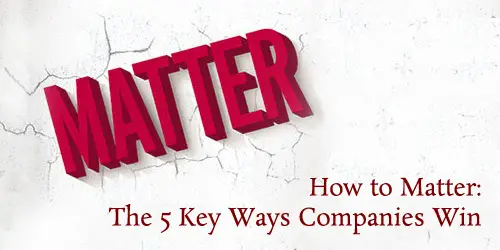 |
 |
12.22.16

How to Matter: The 5 Key Ways Companies Win
IN TODAY'S ECONOMY of volatility and velocity, the lifespan of a Fortune 500 company has plummeted from an average 50 years to a mere fifteen. When constant disruption is the new normal, how do companies succeed? They find a way to matter. When we looked at thirty-plus case studies of successful companies, we found that they all share an audacious approach to disruption. Large to small, in fields from construction to tech to health care, they win hearts, minds and wallets by innovating ways to stay the obvious choice in the market. Here are five key ways that winning companies stay on top: 1. Embrace disruption. Great companies recognize disruption and face it. They don’t try to stick to business as usual. They see disruption as an opportunity to adapt and grow, staying the obvious choice in the changing marketplace. Case in point: Burberry. When threatened by faster, cheaper online competitors, the legendary retail company confronted this digital disruption head-on. CEO Angela Arendt and her team created digital and omni-channel shopping experiences to stay relevant. By adding digital without compromising the quality of the 160-year-old brand, Burberry regained market superiority in the new retail economy. 2. Offer more value. By solving challenges their costumers, employees and stakeholders face, companies become the ones that matter. They offer value by identifying an authentic need and meeting it. Case in point: Blueshore Financial. This former working-class credit union in British Columbia seized an opportunity that bigger banks missed: unique customer experience. Financial “spas” with personalized, concierge service and expert advice transformed Blueshore into the bank of choice for affluent clients. In 2014, it had more than twice the administration assets of its closest competitors. 3. Seek out the right partners. Smart companies create strategic partnerships to help mitigate the volatility and velocity that disrupt the marketplace. Case in point: DeBeers. New Russian mines began producing a bumper crop of diamonds that threatened to flood the market. DeBeers worked out a partnership to become their sole distributor, and control supply. The legacy firm continues to innovate and form key partnerships to sustain the health of the marketplace. 4. Care about more than profits. Successful organizations embrace a broad perspective when tackling challenges and align company values with strategic initiatives to improve lives. Case in point: Unilever. When the soap giant wanted to cross into nonwestern markets, it identified a cultural gap and a serious social need. Washing hands was not a habit, and children’s rates of fatal infections and diarrhea were high as a result. Unilever partnered with Red Cross and UNICEF hygiene initiatives including a grassroots, mother-to-mother campaign. The soap giant was instrumental in a marked improvement in children’s health. 5. Identify future needs. Disruption in the tech market is relentless. Without constant innovation, one-time market giants quickly find themselves irrelevant. Winning companies take a long view and use disruption to pinpoint the needs of the future. Case in point: Adobe. Countless rivals and the emergence of the Cloud diminished Adobe’s primacy in design software and products. It bypassed its original customer base (art directors and designers), and retooled as a strategic partner to marketing executives. Adobe reshaped the market by offering design services, social media help, and subscriptions in an all-in-one creative, cloud-based solution. Companies that boldly embrace the disturbances that threaten to derail them are the ones that prevail, as we found out. And their success is far less about products, and far more about value. These are the firms that raise the bar. 
Posted by Michael McKinney at 03:14 PM
|
BUILD YOUR KNOWLEDGE
 

How to Do Your Start-Up Right STRAIGHT TALK FOR START-UPS 
Grow Your Leadership Skills NEW AND UPCOMING LEADERSHIP BOOKS 
Leadership Minute BITE-SIZE CONCEPTS YOU CAN CHEW ON 
Classic Leadership Books BOOKS TO READ BEFORE YOU LEAD |